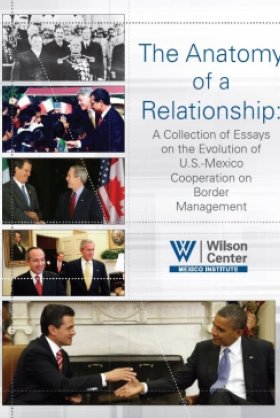The Anatomy of a Relationship: A Collection of Essays on the Evolution of U.S.-Mexico Cooperation on Border Management


The conventional wisdom among those who study the border is that following the terrorist attacks of September 11, 2001, the United States unilaterally imposed significant additional security requirements on the management of the U.S.-Mexico border, and that the measures taken to meet these requirements have made the border more difficult to cross for not only illicit but also licit traffic, including the trade and travel that is the lifeblood of cross-border communities. There is much truth in this interpretation, but it largely portrays Mexico as a passive receptor of U.S. policy, which could not be further from reality.
Rather, the increasing relevance of transnational non-state actors—terrorist groups, organized crime networks—posing border and national security threats in the region have demanded increased international cooperation to monitor and mitigate the risks. At the same time, the U.S. and Mexican economies have become ever more deeply integrated, causing significant growth in cross-border traffic and placing the efficient management of the U.S.-Mexico border as a first-order national interest for both countries.
The post-2001 border management framework has pushed away from the traditional understanding of the border as a line in the sand and moved toward an approach that seeks to secure and (in the case of licit travel and commerce) facilitate flows. This focus on transnational flows has expanded the geographic scope of what were traditionally border operations and thus required an internationalization of border management, the development of partnerships and cooperative methods of border administration.
Over the past decade and a half, the United States and Mexico have transitioned from largely independent and unconnected approaches to managing the border to the development and implementation of a cooperative framework. With contributions from government officials and other top experts in the field, this collection of essays explores the development of cooperative approaches to the management of the U.S.-Mexico border. The essays were released individually throughout the fall of 2015 and published as a volume in early 2016.
Authors

Assistant Secretary for International Affairs and Chief Diplomatic Officer for the US Department of Homeland Security (DHS) Office of Policy, and Vice President of INTERPOL for the Americas Region


Professor and Graduate Director, Department of Political Science and International Relations, University of San Diego; Director, "Justice in Mexico" Project


Associate Professor, Centro de Investigación y Docencia Económicas (CIDE)


Mexico Institute
The Mexico Institute seeks to improve understanding, communication, and cooperation between Mexico and the United States by promoting original research, encouraging public discussion, and proposing policy options for enhancing the bilateral relationship. A binational Advisory Board, chaired by Luis Téllez and Earl Anthony Wayne, oversees the work of the Mexico Institute. Read more



